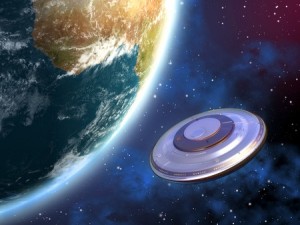Atheists and Aliens: Would the Existence of Extraterrestrials Mean the End of Religion?
 Illustration by Andreus / 123RF
Illustration by Andreus / 123RF In A Brief History of Time Professor Stephen Hawking asks, “…if the universe is really completely self-contained, having no boundary or edge, it would have neither beginning nor end: it would simply be. What place, then, for a creator?” Indeed, the more humanity learns about the universe in which we are just a very miniscule part, the less need we seem to have for a higher power. The theory of evolution cogently describes how we as a species came into being, and the Big Bang elegantly enumerates on how the universe itself came into existence. As our scientific understanding expands, purely religious answers for life’s “big questions” seem to contract. But what would it mean for belief—or non-belief—if we discovered the existence of extraterrestrial life?
This question is central to the premise of a new book, Religions and Extraterrestrial Life: How Will We Deal with It? by David Weintraub, an astronomy professor at Vanderbilt University. The book examines the stances, if any, of the world’s major religions in regards to the possibility of life beyond our own planet. Wintraub reports that one-fifth to one-third of Americans believe that alien life exists, and with the exponential increase in the discovery of new planets, finding one that would harbor living beings seems more and more likely.
However, not all Americans are quick to embrace the idea of extraterrestrials. While Weintraub found that 55 percent of atheists felt that the existence of aliens was possible, his book also states that evangelical and fundamentalist Christians are the least likely of any religious group in the United States to embrace the thought that life may exist beyond Earth. An article on Futurity examines this reticence of fundamentalists Christians to believe in aliens in terms of salvation—Christian concepts of original sin and the need for atonement through Christ’s sacrifice on the cross would be complicated by the existence of otherworldly beings who may or may not require the same redemption.
While theological debates over the implications of alien life may be theoretically interesting, one factor that the Futurity article does not take into account is the distrust of science among fundamentalist Christians. Worldviews such as creationism and intelligent design present a purely human-centric view of the universe. From this perspective, the universe was created in six, 24-hour days—never mind that from a universal perspective, the concept of a “day” is relative to what planet one might inhabit. Also inherent in the fundamentalist Christian perspective is the idea that God gave humanity dominion over all of creation, meaning that humans have free reign to do with the earth’s natural resources, and presumably the resources of other planets, as they please. The existence of extraterrestrials, however, would muddy these straightforward concepts found in fundamentalist Christianity. Alien life, especially intelligent alien life, would mean that our perspective of the universe is relative and that we as a species are not specially appointed to control the cosmos.
Weintraub points out that not all religions would be troubled by the discovery of aliens. Hinduism and Buddhism have speculated that humans could be reincarnated as extraterrestrials, while Judaism and Islam see their tenants as only applicable to humans on Earth, regardless of life on other planets. Even some Catholics and Protestants have managed to somewhat ambiguously incorporate extraterrestrials into their understanding of God’s plan. While the discovery of life on other planets might strike a blow to the worldviews of fundamentalists, the existence of aliens would not necessarily mean the end of religion.
Humanism, with its emphasis on science and logical reasoning, would have no qualms about accepting the presence of extraterrestrials, if such beings could be scientifically demonstrated to exist. Instead of looking to ancient texts or dogma to determine the possibility of alien life on other planets, humanists must merely wait for the evidence.
Do you believe that there are aliens on other planets? Why or why not?
